Photo by Kenneth Lu.
About a week after our son Eliot was born, a striking article appeared in the New York Times: “The Korean Dads’ 12-Step Program.” You might remember it. Hyphen tweeted it like this: “Tiger mom, meet Korean dad.” It was about a “Father School” in southern California designed to help Korean fathers become emotionally available to their wives and children.
Like many first- and second-generation Asian Americans, I read the article with a familiar combination of fascination and horror -- I say familiar because it’s the feeling I get whenever I think about or engage with my own father’s emotions. “Father School,” it turns out, is basically a twenty-hour long honesty-orgy. There’s even an activity where participants practice saying “I love you” and ask their wives out on dates.
And then the article ends with this:
Toward the end of the evening, the lights dimmed, and the students filed out of the room. Twenty minutes later, they returned carrying a small, plastic tub filled with water. They knelt down before their wives and removed their stockings and shoes. Some of the women wept as their husbands gently massaged their toes.
Over in a corner, Rhim was hunched over, drying Hanna’s feet. She wasn’t crying, but as he worked, she leaned down to rest her head on his shoulders.
I know: holy shit. I still find the scene difficult to read.
Granted, I originally read the article in a haze of sleep deprivation and pituitary confusion, but at the time it really helped to mark the difference between the kind of father that I was very obviously going to become, and the kinds of fathers that I knew growing up.
That is, by whatever quirk of culture, genetics or upbringing, I’ve become an “engaged” father.
What is that? I don’t know if there’s a rigorous definition, but I learned the term when I found out about a children’s book that Oakland artist Janine Macbeth has been working on, Oh Oh, Baby Boy!, subtitled “The Makings of Engaged Fatherhood.” It’s a beautifully illustrated book intended not only to celebrate “engaged fathers and the boys they once were,” but also to “nudge that culture shift” by creating positive images of engaged fathers.
Here’s how Janine defines “engaged” in a post on her blog: “Full participation, equal partnership, compassion, intention.” That certainly encompasses it. The extensive comments go on to do a great job of describing a kind of father who is fully involved emotionally and logistically.
One mother put it this way:
To me, it means having a husband who is not just the babysitter, but an active parent. He isn’t there just to change diapers, but to raise our baby as an true partner. Although he can’t do a lot of the parenting while she’s still so little, it means supporting me in multiple ways, whether that means supporting me in breastfeeding, making sure I’m well-rested, making yummy meals, or just to tell me I’m doing a good job. He’s not afraid to take care of her when I’m not there, and is looking forward to being involved in her life.
There’s a big difference, in other words, between performing your parental duties and being an engaged father.
Truth be told, being an engaged father comes with perks. We’re fairly easy to spot. You see us walking around with our children strapped to our chests, for instance. We also tend to pay more attention to our children than our smartphones (except when it’s my turn in Words with Friends). As a result, we get smiles and wistful sighs from passersby. Lots of smiles and sighs. Sometimes people find it difficult to restrain themselves. Like the woman who sold me taiyaki on my first “Dude’s Day Out” with Eliot. She took one look at us and cooed: “You are so good to be taking care of your boy.”
We’re the fathers who go above and beyond what’s expected of us. I know that sounds self-congratulatory, and maybe distasteful, but it’s the flipside of a sad fact about our culture. Michael Chabon nailed it in Manhood for Amateurs when he observed that “The handy thing about being a father is that the historic standard is so pitifully low.”
Pitifully low.
What’s tragic -- pathological, rather -- is that engaged fathers are praised so highly (when they are praised at all) for doing a bare minimum that’s simply expected of mothers. It’s hard to decide which side of the double standard is worse. Praise is all well and good, but basic respect is more crucial. Even in the ostensibly liberal Bay Area, mothers’ work is barely respected, more often merely tolerated, and rarely accommodated. Even when it’s treated with respect, it’s often through shrill, aggressive opinions on how mothers ought to be raising their children.
If I’m honest, when I think about it it’s a bit surprising that being an engaged father comes so naturally to me (so far, I should add). The models of fatherhood available to me growing up were, in their Asian manifestations, similar to Edmond Rhim in the Times story: detached and inertial. Even in their Latino and white, Protestant manifestations (the only other cultures I knew growing up in northwest Houston), they were gruff and laconic -- manly men who wanted their boys to grow up to be even manlier men.
In other words, very few of the fathers I knew talked much or brooked emotions more complex than hunger, anger and television. You know these guys. They aren’t bad people; the only thing you can blame them for is being conventional.
That said, even though engaged fatherhood is something I truly believe is close to the way things ought to be, I accept that there are other ways to be a good father. I turned out ok (I think). If there’s one thing you learn very quickly as a parent, it’s a kind of relativism. There are many, many ways to raise a healthy, emotionally well-adjusted child. Much of the challenge of parenting today is, in fact, sorting through all of these perspectives and values.
But being an engaged father is not the norm. It’s idiosyncratic. And as with all things that fall outside the norm, living it entails being somewhat didactic. It would be nice to just be a father whose engagement is familiar to everyone, even taken for granted.
And that, finally, is why it’s so reassuring to discover people like Janine doing work that hits just the right note of positivity (and does a better job than me of not being preachy). There’s also a blog for Asian American fathers called Rice Daddies that I’ve been following. It’s good to see these engaged fathers announcing themselves as such: proud fathers without the patriarchy. We need more images like these.
Janine’s Kickstarter campaign is still going on (until 10/15)! If you’d like to find out more about Oh oh, baby boy!, and/or contribute, please visit her page here, and her project blog here.
Update, 10/13: I just found out about a zine called Rad Dad that's also dedicated to engaged fatherhood. The first Rad Dad anthology was published this year, and they're having some upcoming release events in LA and the Bay Area! Check out the zine's blog here, and buy a copy of the anthology here.
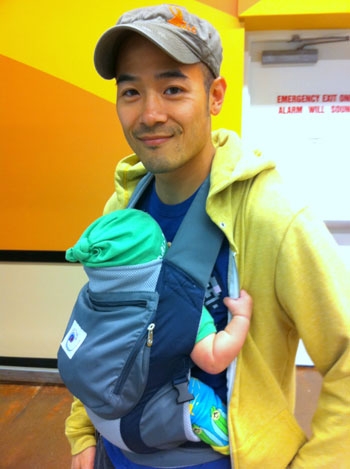
Engaged father, spotted in the wild with cub.






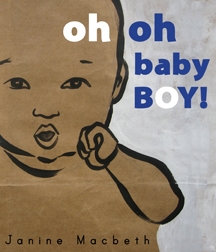
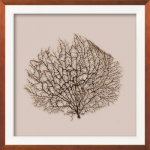
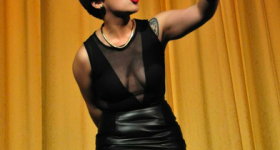
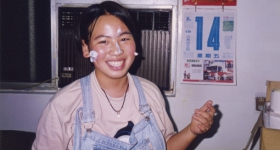

Comments